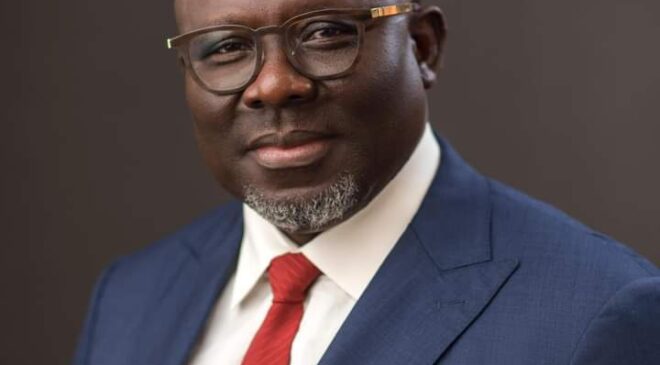
By Elohor Foghola
As Governor Sheriff Oborevwori marks his second year in office, the Delta State Oil Producing Areas Development Commission (DESOPADEC) stands as a cornerstone of his administration’s commitment to inclusive development under the MORE Agenda.
Through the leadership of the Chairman Chief Barr. John Nani and Managing Director Chief Festus Ochonogor, the Commission has delivered wide-ranging infrastructure and human capital projects to the state’s oil-producing communities.
“Sustainable development is the pathway to the future we want for all,” former UN Secretary-General Ban Ki-moon once noted. “It offers a framework to generate economic growth, achieve social justice, exercise environmental stewardship, and strengthen governance.” This philosophy mirrors the core of DESOPADEC’s work—delivering meaningful progress that balances infrastructure, empowerment, and sustainability.
Since 2023, DESOPADEC has recorded visible transformation across its six mandate ethnic nationalities—Urhobo, Ijaw, Isoko, Ndokwa, Itsekiri, and Ika. Infrastructure development has been one of its most measurable areas of success. Over 60 road and jetty projects have been delivered, with about 80% completed and the rest ongoing.
Among the key road projects are Oyibo Road, Eriakhewhe Street, and Asupa Road in Jesse; Golf Road in Oghareki; Ezewu Road and Onosode Road in Ughelli; and Etapobunor Road in Sapele. In Amukpe, Capricorn Road was constructed, while Uvwie saw the development of Oku-Isoko Road and Pastor Okpobor Road in Iyede.
Warri South and Warri South West also witnessed the rehabilitation of critical roads like the Ubeji Gas Road, Gas Pipeline Road to Agbolaya Close, Madam Dora Road in Ifiekporo, and Aja-Etan and Orugbo Roads. Jetties, essential to riverine access, were constructed in Benemogbene, Sokebolo, and Fenegbene.
Complementing roads, the Commission invested in health infrastructure. In Warri South, Egbokodo and Ugbori got new health centers, while Ode-Itsekiri and Orugbo in Warri South West also benefited. A maternity ward was added to Koko General Hospital in Warri North, and facilities in Egberide (Ughelli South) and Utagbo Uno were either renovated or expanded.
Other health projects include the Obuguru, Youbebe, and Tamigbe Health Centers in Burutu; renovations in Kpakiama (Bomadi); and a fenced, newly constructed Health Center in Ikepide-Irri, Isoko South. These facilities bring critical medical access closer to underserved populations.
Housing development also featured prominently, with over 50 residential bungalows—ranging from one to three bedrooms—constructed in Oboghoro (Warri North), Ajansan (Warri South West), and multiple riverine and inland communities including Ogheye-Egboroke, Kokodiagbene, and Tuomo.
In education, DESOPADEC completed and rehabilitated more than 55 institutions. Noteworthy among these are the ultra-modern Iwere College in Koko, Beach Secondary School (Koko), and Azama Zion Primary School with six classroom blocks. Corps members’ lodges, ICT halls, and libraries were added in communities like Jones Creek, New Diebiri, and Oporoza.
Renovation and new constructions were also carried out at St. Michael’s College (Oleh), Ogbe-Udu Secondary School, and schools in Ukwani, Edjekota Ogor, and Okpare Olomu. These efforts are geared toward improving access to quality education and fostering academic excellence.
To address electricity and water access, DESOPADEC installed solar-powered streetlights and water systems across several communities. Power transformers were distributed to stabilize supply, ensuring reliable energy in underserved areas.
Environmental interventions became necessary due to flooding risks in Delta’s lowland terrains. In 2024 alone, desilting of drains and canal clearance was conducted in Jesse, Agbarho, Sapele, Ughelli, Agbor, Ndokwa, Umutu, and Warri South. Canalization projects were executed in Tisun and Inorin creeks, while shore walls were constructed in Ajuju, Ikeremor, and Oloukpagbene.
Recognizing the role of security in sustainable development, DESOPADEC built police quarters in Etua-Etiti and a divisional headquarters in Aboh. In Osubi, a modern police station and accompanying residential quarters were completed to support law enforcement and deter crime.
The Commission has also prioritized human capital development. Through the DESOPADEC Skill Academy, 195 young men and women were trained in 2023 and given N200,000 plus starter packs. In 2024, the initiative expanded, supporting over 200 youths with starter kits and a N500,000 grant to cushion inflation effects and encourage entrepreneurship.
Beyond structures and training, the Commission has deepened engagement with traditional rulers and youth leaders to foster peace and security. These collaborations have helped resolve community unrest and create an enabling environment for oil operations and local development.
Internally, DESOPADEC has undergone critical reforms to align with the Delta State Civil Service. Staff restructuring, promotions, and training in administrative processes like memo writing and documentation have enhanced operational efficiency.
On staff welfare, Governor Oborevwori is the first governor in Delta State history to implement the minimum wage for DESOPADEC workers, reinforcing his administration’s commitment to staff welfare and institutional growth.
Speaking on these milestones, Chief Ochonogor commended Governor Oborevwori’s consistency in monitoring and inspecting projects. “The Governor has not just funded projects; he has shaped a culture of accountability and discipline that drives excellence,” he said.
Ochonogor emphasized that while infrastructure is key, true progress depends on community ownership and active civic participation. “The MORE Agenda is not a slogan—it’s a collective call to action,” he urged.
Two years on, DESOPADEC’s progress under Governor Oborevwori is both visible and impactful. From jetties in the creeks to ICT centers in classrooms, and health centers in hard-to-reach villages, the Commission is transforming Delta’s oil-bearing communities one project at a time.
With more communities seeing the ripple effects of these interventions, stakeholders and residents alike are beginning to believe again in the power of government to deliver change—deliberate, inclusive, and lasting.
